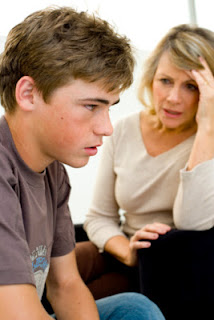What do you do if you find out your child is using drugs?
 Discovering that your child is experimenting
with illicit drugs is every parent's worst fear. No matter what their
attitude towards drugs, I have yet to meet a parent who is not, at the very
least, extremely distressed when they find themselves in this situation. No
matter how you may have prepared yourself (and to be quite honest, I doubt
whether any parent spends too long thinking about such a possibility), it is
always going to evoke a whole pile of emotions. Disappointment, anger and, of course, fear
are most going to be bubbling to the surface and many parents are also
going to start blaming themselves in some way.
Discovering that your child is experimenting
with illicit drugs is every parent's worst fear. No matter what their
attitude towards drugs, I have yet to meet a parent who is not, at the very
least, extremely distressed when they find themselves in this situation. No
matter how you may have prepared yourself (and to be quite honest, I doubt
whether any parent spends too long thinking about such a possibility), it is
always going to evoke a whole pile of emotions. Disappointment, anger and, of course, fear
are most going to be bubbling to the surface and many parents are also
going to start blaming themselves in some way.
Recently I was contacted by a mother who
had just discovered that her son has been using cannabis. She explained the
situation she found herself in and wrote "I am at a loss and not sure what to
do or how to approach this, I am yet to confront him about it."
The most important thing to do is also the
most difficult – don't overreact! Before you respond make sure you take some
time to think through what you are going to do and how you are going to
approach this extremely difficult situation. Talk to your partner and discuss
where, when and how you are going to raise the issue. Those three elements (the
where, when and how) are all equally important and will play a major part in the
success of your strategy.
The best chance of moving this forward in a
positive way is to sit down and talk to your child about your discovery. If you
have planned the discussion well and don't overreact you may find that they are
more willing to be honest and open in that area. There are no rule books when
it comes to discussions like this but there are four key elements that may
assist in making it more successful:
- Show your concern – make it clear that you love your child unconditionally and that nothing will stop that. However, if they have been using illegal drugs they have broken the law and there will be consequences as a result
- Choose your moment – make sure that you are calm and that your teenager is in the right headspace. Trying to have a conversation like this as soon as they walk through the door after school may not be the best time. You're also going to get a much better outcome if the discussion does not seem like an ambush
- Recognise problems – the most important question you can ask your child is "why are you taking the drug?" If they say it gives them a good feeling or to have fun times with their friends, you shouldn't necessarily be doing cartwheels and saying that everything is now going to be fine, but it is much more encouraging than if they start talking about using it to satisfy a need, to feel better or to solve problems
- Don't blame yourself – make sure you don't go down the road of thinking that you have failed as a parent. This isn't going to help anyone and is likely to cause even more problems between you and your child
If there is a silver lining to this type of
incident it's going to be that a dialogue has started. Unfortunately, some
parents never start talking to their children about drugs until something like
this happens. If they get their response right and don't fly off the handle without thinking it through carefully there is the real
possibility that some good may come out of it. For many young people, simply getting caught, being made aware of how their actions have affected the family and applying appropriate consequences is enough to change behaviour - but of course this is not always the case and further steps may need to be taken, particularly if they make it clear that they have no intention of stopping their drug use. So what do you do then? For my suggestions on how to deal with this take a look at my blog entry - 'Your teen has admitted using drugs and isn't going to stop: What do you do?'



This is practical, good advice for parents. Many parents will quickly overreact to discovering their kid(s) drug use. As you pointed out - showing concern, choosing your moment, recognizing problems, and not blaming oneself - all help parents to deal with the initial shock, and respond appropriately to their kids. Some parents think martial law will get things done. "No drugs in my house", and that's the end of the conversation! For those of you with similar thoughts, remember that lying or not dealing with the issue can cause even more problems. Systematically lying to children about drugs their whole life can sometimes cause kid(s) to begin to question what else they've been lied to about, which can end with the kid(s) experimenting because society has misled them and they can only trust their own experiences
ReplyDelete